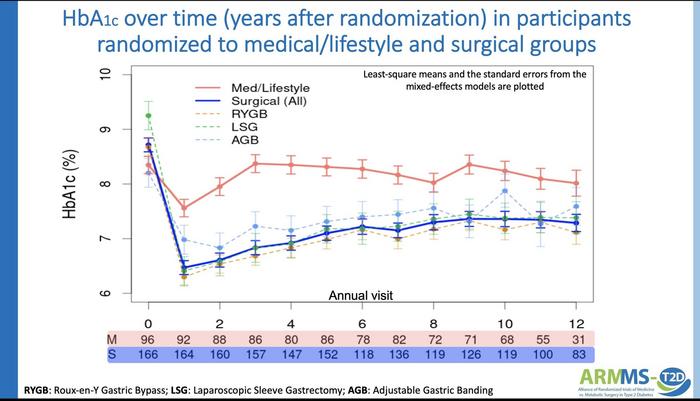Metabolic or bariatric surgery results in superior glycemic control, less medication usage and high rates of remission of Type 2 diabetes than medical or lifestyle intervention in patients with class 1 obesity, as described in a recently published report by researchers of Pennington Biomedical Research Center and others.

Credit: ARMMS Metabolic Surgery
Metabolic or bariatric surgery results in superior glycemic control, less medication usage and high rates of remission of Type 2 diabetes than medical or lifestyle intervention in patients with class 1 obesity, as described in a recently published report by researchers of Pennington Biomedical Research Center and others.
The study, which evaluated more than 250 participants for up to 12 years, represents the largest cohort of people assessed for the long-term durability of the two treatments. The results were presented at the 83rd Scientific Sessions Conference by the American Diabetes Association in San Diego.
“The longer the study duration, the stronger the message in terms of remission of type 2 diabetes,” said ARMMS-T2D Principal Investigator John Kirwan, MSc, PhD, Executive Director and the George A. Bray, Jr. Endowed Super Chair in Nutrition, Pennington Biomedical Research Center. “The study addressed the durability of glycemic control after surgery, the longer-term efficacy and safety, and potential reasons some patients experience relapse.”
The study is the longest running of its kind. From May 2007 to August of 2013, 262 participants with Type 2 diabetes were recruited and randomized into either the metabolic surgery group or medical/lifestyle intervention group. With a median follow-up of 11 years, those in the metabolic surgery group saw an increased reduction in blood sugar, great rates of diabetes remission, and significantly greater weight loss than those in the medical/lifestyle intervention group.
“These landmark results further enforce the confidence we have in the success and efficacy of metabolic and bariatric surgery. For those patients who are in serious need of weight loss, and for whom diet, exercise and medication did not produce the desired results, these patients can be assured that this operation is safe, and the results are well established,” said Dr. Philip Schauer, Director of Metamor Metabolic Institute at Pennington Biomedical.
At the American Diabetes Association’s conference, Assistant Chief of Clinical Affairs in the Division of Endocrinology, Diabetes and Metabolism at Weill Cornell Medicine New York Presbyterian Dr. Sangeeta Kashyap introduced the study and presented The Case for an RCT of Metabolic Surgery and Type 2 Diabetes. Physician-scientist Dr. Mary-Elizabeth Patti, an Associate Professor of Medicine at Harvard Medical School, reviewed and shared the study design. Dr. Anita Courcoulas, MPH, FACS, and Chief of the Division of Minimally Invasive Bariatric and General Surgery at the University of Pittsburgh, discussed the long-term outcomes and diabetes remission resulting from the study. Dr. Robert H. Eckel and ADA President, Medicine & Science, shared the implications of clinical management of type two diabetes.
The study represented a long-term collaboration of researchers from a variety of esteemed research centers and clinics, including Pennington Biomedical Research Center, the University of Pittsburgh’s Department of Surgery, the Joslin Diabetes Center’s research division, Harvard Medical School, the Department of Quantitative Health Sciences and the Department of Surgery at the Cleveland Clinic, Kaiser Permanente Washington Health Research Institute, Brigham and Women’s Hospital’s Division of Endocrinology and its Division of General & GI Surgery, Diabetes and Hypertension, the University of Kansas Medical Center’s Department of Internal Medicine, Division of Physical Activity and Weight Management, the Division of Endocrinology, Diabetes and Metabolism at Weill Cornell Medical Center, the Department of Medicine at the University of Washington and VA Puget South Health Care System.
About the Pennington Biomedical Research Center
The Pennington Biomedical Research Center is at the forefront of medical discovery as it relates to understanding the triggers of obesity, diabetes, cardiovascular disease, cancer and dementia. The Center architected the national “Obecity, USA” awareness and advocacy campaign to help solve the obesity epidemic by 2040. The Center conducts basic, clinical, and population research, and is affiliated with LSU.
The research enterprise at Pennington Biomedical includes over 480 employees within a network of 40 clinics and research laboratories, and 13 highly specialized core service facilities. Its scientists and physician/scientists are supported by research trainees, lab technicians, nurses, dietitians, and other support personnel. Pennington Biomedical is a state-of-the-art research facility on a 222-acre campus in Baton Rouge.
For more information, see www.pbrc.edu.
Journal
Diabetes Care




